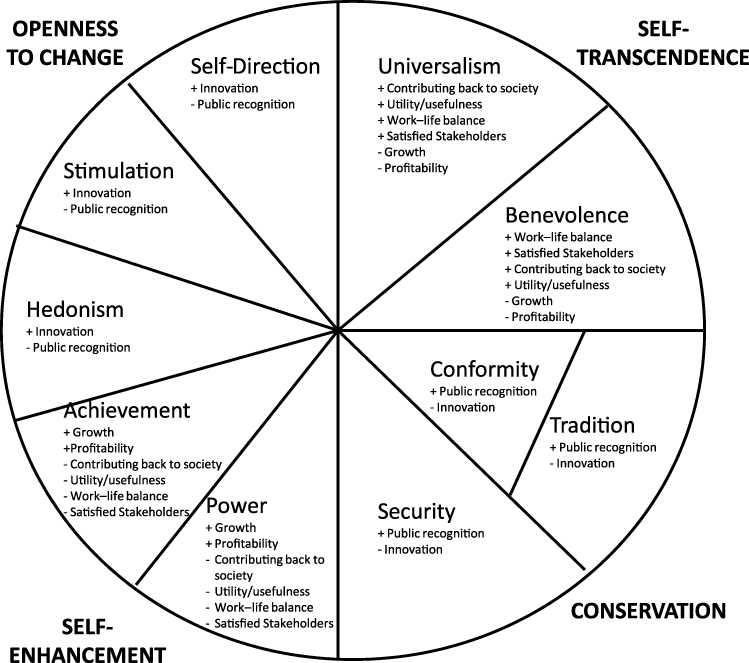according to a survey of 150 Dutch small business owners
In 2011, an interesting study on Small Business Success based on Owner Values and Personal Differences was undertaken in Dutch by Marjan J. Gorgievski, M. Evelina Ascalon, Ute Stephan.
Entrepreneurial Success Criteria
| 1. Profitability: high yields, good profit margin. |
| 2. Growth: growth in the number of employees, sales, market share and/or distribution. |
| 3. Innovation: introduction of new products or production methods. |
| 4. Firm survival/continuity: enables generational transfer or can be sold with a profit. |
| 5. Contributing back to society: socially conscious, sustainable production methods. |
| 6. Personal satisfaction: through attaining important things in life, such as autonomy, challenge, security, power, creativity, etc. |
| 7. Satisfied stakeholders: satisfied and engaged employees, satisfied customers. |
| 8. Good balance between work and private life: positive mutual influence between work and private life, allows time for yourself, family, and friends. |
| 9. Public recognition: good reputation, prizewinner. |
| 10. Utility or usefulness: organization fulfills a need in society; it provides an important service or product. |
Schwartz Value Dimensions
| Power: Social status and prestige, control, or dominance over people and resources. (I like to be in charge and tell others what to do. I want people to do what I say.) |
| Achievement: Personal success through demonstrating competence according to social standards. (Being very successful is important to me. I like to stand out and to impress other people.) |
| Hedonism: Pleasure and sensuous gratification for oneself. (I want to enjoy life. Having a good time is very important to me.) |
| Stimulation: Excitement, novelty, and challenge in life. (I look for adventures and like to take risks. I want to have an exciting life.) |
| Self-direction: Independent thought and action-choosing, creating, exploring. (I think it is important to be interested in things. I am curious and try to understand everything.) |
| Universalism: Understanding, appreciation, tolerance, and protection for the welfare of all people and for nature. (I think it is important that every person in the world should be treated equally. I want justice for everybody, even for people I do not know.) |
| Benevolence: Preservation and enhancement of the welfare of people with whom one is in frequent personal contact. (I always want to help the people who are close to me. It is very important to me to care for the people I know and like.) |
| Tradition: Respect, commitment, and acceptance of the customs and ideas that traditional culture or religion provide the self. (I think it is important to do things the way I learned from my family. I want to follow their customs and traditions.) |
| Conformity: Restraint of actions, inclinations, and impulses likely to upset or harm others and violate social expectations or norms. (I believe that people should do what they are told. I think people should follow rules at all times, even when no one is watching.) |
| Security: Safety, harmony and stability of society, of relationships, and of self. (The safety of my country is very important to me. I want my country to be safe from its enemies.) |

Conclusion:
Business owners rated ten success factors. The top three rankings were personal satisfaction, profitability, and satisfied stakeholders. The two dimensions that underlie the rank order of success criteria were found using multidimensional scaling methods to be person-oriented (personal satisfaction vs business growth) and business-oriented (profitability versus contributing back to society). Furthermore, self-enhancing value orientations (power and achievement) influenced business development, profitability, and innovations. Softer success criteria, like satisfied stakeholders and a decent work-life balance, were directed by self-transcendent value orientations (benevolence and universalism).
Where are you in this table? How do you measure the success of your business?
Full article HERE







